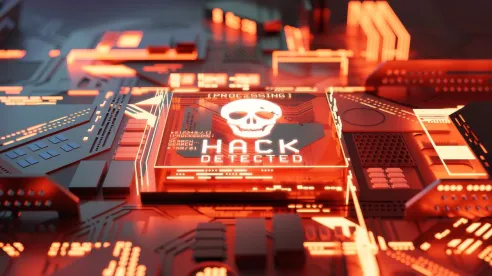On May 19, 2022, the Department of Justice announced it would not charge good-faith hackers who expose weaknesses in computer systems with violating the Computer Fraud and Abuse Act (CFAA or Act), 18 U.S.C. § 1030. Congress enacted the CFAA in 1986 to promote computer privacy and cybersecurity and amended the Act several times, most recently in 2008. However, the evolving cybersecurity landscape has left courts and commentators troubled by potential applications of the CFAA to circumstances unrelated to the CFAA’s original purpose, including prosecution of so-called “white hat” hackers. The new charging policy, which became effective immediately, seeks to advance the CFAA’s original purpose by clarifying when and how federal prosecutors are authorized to bring charges under the Act.
DOJ to Decline Prosecution of Good-Faith Security Research
The new policy exempts activity of white-hat hackers and states that “the government should decline prosecution if available evidence shows the defendant’s conduct consisted of, and the defendant intended, good-faith security research.” The policy defines “good-faith security research” as “accessing a computer solely for purposes of good-faith testing, investigation, and/or correction of a security flaw or vulnerability, where such activity is carried out in a manner designed to avoid any harm to individuals or the public, and where the information derived from the activity is used primarily to promote the security or safety of the class of devices, machines, or online services to which the accessed computer belongs, or those who use such devices, machines, or online services.”
In practice, this policy appears to provide, for example, protection from federal charges for the type of ethical hacking a St. Louis Post-Dispatch reporter performed in 2021. The reporter uncovered security flaws in a Missouri state website that exposed the Social Security numbers of over 100,000 teachers and other school employees. The Missouri governor’s office initiated an investigation into the reporter’s conduct for unauthorized computer access. While the DOJ’s policy would not affect prosecutions under state law, it would preclude federal prosecution for the conduct if determined to be good-faith security research.
The new policy also promises protection from prosecution for certain arguably common but contractually prohibited online conduct, including “[e]mbellishing an online dating profile contrary to the terms of service of the dating website; creating fictional accounts on hiring, housing, or rental websites; using a pseudonym on a social networking site that prohibits them; checking sports scores at work; paying bills at work; or violating an access restriction contained in a term of service.” Such activities resemble the facts of Van Buren v. United States, No. 19-783, which the Supreme Court decided in June 2021. In Van Buren, the 6-3 majority rejected the government’s broad interpretation of the CFAA’s prohibition on “unauthorized access” and held that a police officer who looked up license plate information on a law-enforcement database for personal use—in violation of his employer’s policy but without circumventing any access controls—did not violate the CFAA. The DOJ did not cite Van Buren as the basis for the new policy. Nor did the DOJ identify any another impetus for the change.
To Achieve More Consistent Application of Policy, All Federal Prosecutors Must Consult with Main Justice Before Bringing CFAA Charges
In addition to exempting good-faith security research from prosecution, the new policy specifies the steps for charging violations of the CFAA. To help distinguish between actual good-faith security research and pretextual claims of such research that mask a hacker’s malintent, federal prosecutors must consult with the Computer Crime and Intellectual Property Section (CCIPS) before bringing any charges. If CCIPS recommends declining charges, prosecutors must inform the Office of the Deputy Attorney General (DAG) and may need to obtain approval from the DAG before initiating charges.






 />i
/>i
